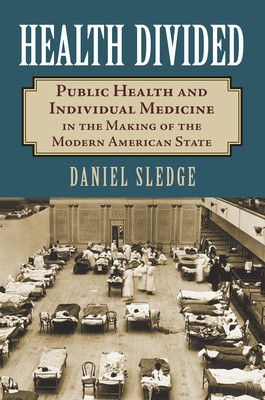
- We will send in 10–14 business days.
- Author: Daniel Sledge
- Publisher: University Press Of Kansas
- ISBN-10: 0700624309
- ISBN-13: 9780700624300
- Format: 15.5 x 23.6 x 2.5 cm, hardcover
- Language: English
- SAVE -10% with code: EXTRA
Reviews
Description
The United States' health care system stands out for its strict division of policies dealing with public health and individual medicine. Seeking to explain how this division came to be, what alternative paths might have been taken, and how this shapes the contemporary landscape, Daniel Sledge offers nothing less than a reinterpretation of the making of modern American health policy in Health Divided.
Where previous scholars have focused on failed attempts to adopt national health insurance, Sledge demonstrates that the development of health policy cannot be properly understood without considering the connections between public health policy and policies dealing with individual medicine. His work shows how the distinct politics of the formative years of health policy--and the presence of debilitating diseases in the American South--led to outcomes that have fundamentally shaped modern policies and disputes. Until the end of the nineteenth century, health care in the United States was seen as a local issue, with the sole exception being the government's role in providing care to seamen and immigrants. Then, as Health Divided reveals, the health problems that plagued the American South in the early twentieth century, from malaria to hookworm and pellagra, along with the political power of the southern Democrats during the New Deal, fueled the emergence of national intervention in public health work. At the same time, divisions among policymakers, as well as the resistance of the American Medical Association, led to federal inaction in the realm of individual medical services--setting the stage for the growth of employer-sponsored health insurance. The vision of those who built the institutions that became the Centers for Disease Control and Prevention was, we see here, far more expansive and innovative than has previously been realized--and it came surprisingly close to succeeding. Exploring the history behind its failure, and tracing the inextricable links between public health and national health policy, this book provides a valuable new perspective on the origins of America's disjointed health care system.EXTRA 10 % discount with code: EXTRA
The promotion ends in 10d.08:14:59
The discount code is valid when purchasing from 10 €. Discounts do not stack.
- Author: Daniel Sledge
- Publisher: University Press Of Kansas
- ISBN-10: 0700624309
- ISBN-13: 9780700624300
- Format: 15.5 x 23.6 x 2.5 cm, hardcover
- Language: English English
The United States' health care system stands out for its strict division of policies dealing with public health and individual medicine. Seeking to explain how this division came to be, what alternative paths might have been taken, and how this shapes the contemporary landscape, Daniel Sledge offers nothing less than a reinterpretation of the making of modern American health policy in Health Divided.
Where previous scholars have focused on failed attempts to adopt national health insurance, Sledge demonstrates that the development of health policy cannot be properly understood without considering the connections between public health policy and policies dealing with individual medicine. His work shows how the distinct politics of the formative years of health policy--and the presence of debilitating diseases in the American South--led to outcomes that have fundamentally shaped modern policies and disputes. Until the end of the nineteenth century, health care in the United States was seen as a local issue, with the sole exception being the government's role in providing care to seamen and immigrants. Then, as Health Divided reveals, the health problems that plagued the American South in the early twentieth century, from malaria to hookworm and pellagra, along with the political power of the southern Democrats during the New Deal, fueled the emergence of national intervention in public health work. At the same time, divisions among policymakers, as well as the resistance of the American Medical Association, led to federal inaction in the realm of individual medical services--setting the stage for the growth of employer-sponsored health insurance. The vision of those who built the institutions that became the Centers for Disease Control and Prevention was, we see here, far more expansive and innovative than has previously been realized--and it came surprisingly close to succeeding. Exploring the history behind its failure, and tracing the inextricable links between public health and national health policy, this book provides a valuable new perspective on the origins of America's disjointed health care system.

Reviews